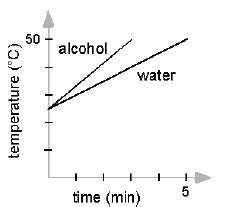
Chemistry, 18.07.2019 00:30 brryan2751
Asap ! equal masses of water and alcohol, both at 25°c, are heated at the same rate under identical conditions. after 3 minutes the temperature of the alcohol is 50°c. it took 5 minutes for the water to reach 50°c. which of the following is true once the water and alcohol have both reached 50°c? a) the water received more energy than the alcohol. b) the alcohol received more energy than the water. c) both received the same amount of energy. d) it is impossible to tell from the information given.


Answers: 1


Other questions on the subject: Chemistry

Chemistry, 21.06.2019 17:10, codeyhatch142
Nitric oxide (no) can be formed from nitrogen, hydrogen and oxygen in two steps. in the first step, nitrogen and hydrogen react to form ammonia: n2(g) + 2 h_2(g) rightarrow 2 nh_3 (g) delta h = -92. kj in the second step, ammonia and oxygen react to form nitric oxide and water: 4 nh_3(g) + 5 o_2(g) rightarrow 4no(g) + 6 h_2o(g) delta h = -905. kj calculate the net change in enthalpy for the formation of one mole of nitric oxide from nitrogen, hydrogen and oxygen from these reactions. round your answer to the nearest .
Answers: 1

Chemistry, 22.06.2019 16:50, shaylawaldo11
Which element is least likely to undergo a chemical reaction
Answers: 3


Chemistry, 23.06.2019 00:30, coralaguilar1702
What is calcium oxide+diphosphorus pentoxide--> calcium phosphate balanced
Answers: 1
You know the right answer?
Asap ! equal masses of water and alcohol, both at 25°c, are heated at the same rate under identical...
Questions in other subjects:

Mathematics, 06.05.2020 20:08


History, 06.05.2020 20:08



Biology, 06.05.2020 20:08

Mathematics, 06.05.2020 20:08

Mathematics, 06.05.2020 20:08


Mathematics, 06.05.2020 20:09



